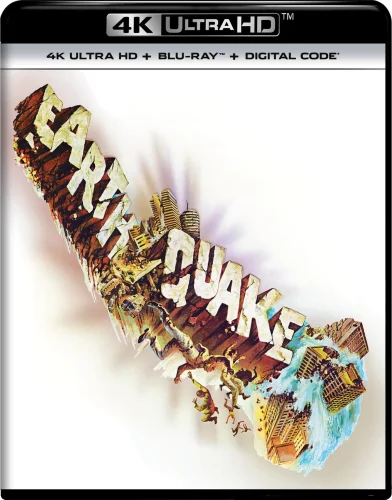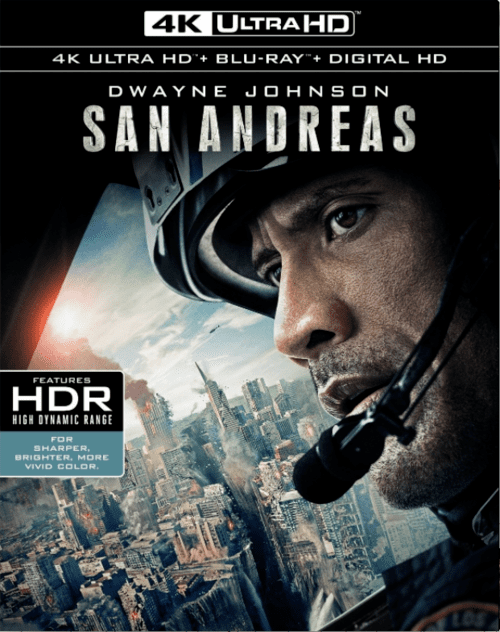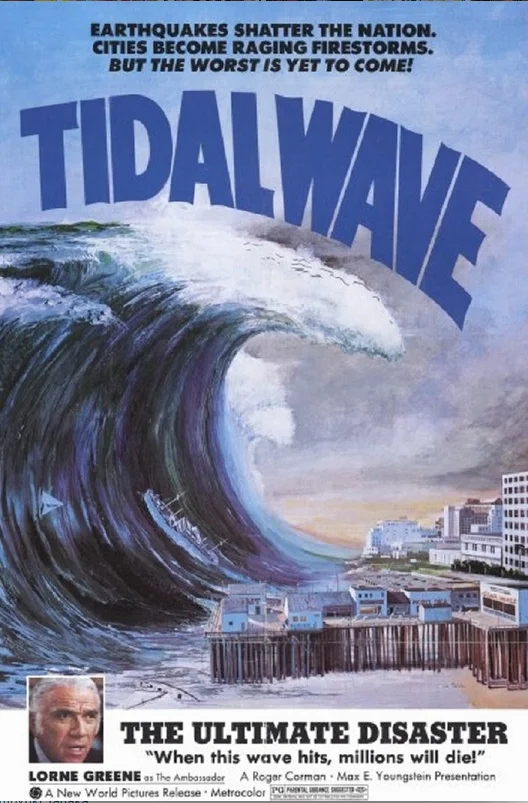Story Movie
When the worst earthquake in the history of mankind strikes Southern California, Los Angeles is rocked and the shock waves shatter the fates of its inhabitants.
Review 4K Movie
Following the release of the latest summer blockbuster, San Andreas, which is the quintessential example of this genre, it is an opportune moment to reflect on its legendary predecessor, the 1974 disaster film Earthquake, and attempt to understand how the genre has evolved over the past 40 years. Earthquake, and try to understand how the genre has evolved over the past 40 years.
So, Los Angeles. A beautiful summer day.
Successful engineer Graff is going through another quarrel with his silly, capricious wife Remi (whose father, Sam, is his boss, the director of a large construction company), after which he goes to visit Dennis, the wife of Graff's former colleague, who is left alone with her son.
Inspector Lou is suspended from work after chasing a traffic offender, which ends in a confrontation with a county police officer.
Scientists at the California Institute of Seismic Research, analyzing the nature of previous tremors, conclude that a major earthquake is imminent.
A girl named Rosa, who doesn't have enough money to buy groceries at the supermarket, unexpectedly receives it as a gesture of gallantry from the manager, Jody, after which we learn that the manager is a reserve sergeant who is bullied by his neighbors.
Stuntman Miles and his friend Sal (who is Rosa's brother) use their last money to prepare a stunt performance on motorcycles designed to impress sponsors.
But all our heroes' plans are ruined by an unprecedented 9.0 earthquake...
Although at the time the film was a real breakthrough in terms of special effects depicting the earth splitting open, and it cannot be said that 40 years later these effects are hopelessly outdated, I personally would say that their level is somewhere between what was seen in The Poseidon Adventure and what was demonstrated in Hell in the Sky. If in the 1972 film a toy ship catches the eye from the very first frames, and this impression only intensifies as the film progresses, then in Hell everything is done so well that it still creates a sense of reality. Earthquake, on the other hand, is uneven in this regard — sometimes you sit with your mouth open, and sometimes you smile as you look at the cardboard houses and foam concrete blocks. Nevertheless, the disaster recreated on screen is much more powerful than the huge computer skyscrapers crumbling under a hail of computer debris in San Andreas, which leave the viewer unmoved.
Before watching the film, I hoped that at least I wouldn't see the clichés that are firmly attached to modern representatives of the genre: a half-mad scientist who is the only one who knows about the disaster, but no one listens to him; family drama with a happy reunion at the end; waving American flags; last-minute rescues; heart-wrenching dialogues in the spirit of “Run! - No, I won't leave you!”; a dog that survived while thousands died, and so on. What can be said about this? In the form in which these and other clichés have become established in our time, they are indeed absent from the film. But it is interesting that here we see many of these clichés in their ‘embryonic state’, corresponding to the moment when the genre was just emerging. Accordingly, instead of a rogue scientist, we have a large institute where adequate scientific discussions take place between supporters of the earthquake theory and its opponents. There are family feuds and searches for wives, but they don't take up much screen time (and the ending of the film will shock modern viewers). There are no American flags or heart-wrenching dialogues, nor is there a cursed dog. There are happy last-minute rescues, but they are done in such a way that they evoke empathy for the hero rather than laughter.
At the same time, the film is much closer to what we now call a “summer blockbuster,” designed to tickle the viewer's nerves, than Heaven's Gate, which was released in the same year: there are no storylines dealing with social issues (those who expect to see corrupt mayors and thieving contractors building buildings that are not earthquake-proof will be disappointed), there are far fewer violent scenes, and the romantic theme is limited to a standard love triangle. However, the character of the timid administrator Jody is interesting, who, after obtaining a weapon, turns into a real thug (thanks in part to this storyline, the film does not descend into complete mindlessness).
Some interesting signs of the times: the view from the roof of a moving police car with flashing lights in the foreground, as well as Graff's phone conversation in the car (now it's even hard to understand how prestigious it was to own such a phone, given that when watching the film, you don't even immediately understand what's so special about it — so what if a man is talking on the phone from a car?
Now for the flaws. Personally, I didn't understand why the film included a storyline with stuntmen. It was so unnecessary that the filmmakers forgot to bring Rosie, Miles, and Sal together at the end, leaving the fate of the two stuntmen unknown. Were they there, or weren't they? Finally, the film has some glaring mistakes, such as an elevator without an automatic brake or a glass roof that remains completely intact after a person falls on it.
As I have already noted, Earthquake is largely a “close-up” blockbuster. What is even more interesting is that, compared to its modern counterparts produced by Emmerich and his followers, the film hardly looks like a masterpiece: while The Day After Tomorrow still traced some motifs of scientists' responsibility to society, and 2012 was great fun thanks to the idiocy of everything that was happening, San Andreas (which is closest to Earthquake in terms of plot) is so sterile, so devoid of originality and what is called ‘the truth of life’, that one cannot help but understand those reviewers who call for ‘burying this virtually dead genre and stopping mocking the corpse’.
In Earthquake, the main characters are ambiguous? In San Andreas, they are plastic musclemen devoid of individuality.
In Earthquake, the rescue of women is a whole story? In San Andreas, the heroine jumps across concrete slabs like a grasshopper!
In Earthquake, Inspector Lou orders Graff, who is looking for Dennis, to get out of the car at gunpoint because the car is needed by other people? In San Andreas, the hero of The Rock takes a government helicopter and calmly sets off in search of his wife!
In Earthquake, we see the interaction of various city services and what it takes to pull people out of the basement of just one collapsed skyscraper. In San Andreas, we don't see a single dead or injured person under the fallen skyscrapers!
In Earthquake, the tense plot keeps you from getting bored. In San Andreas, you risk dislocating your jaw just looking at the falling skyscrapers.
Overall, when compared to modern analogues, I would give the film a 10 out of 10. But objectively, considering what I said earlier, it's still not perfect.



 [/full-link]
[/full-link]



